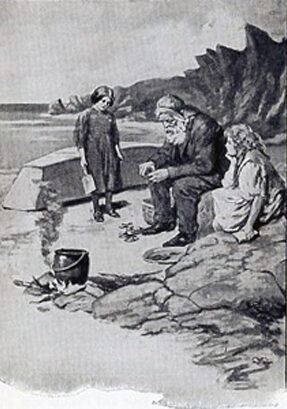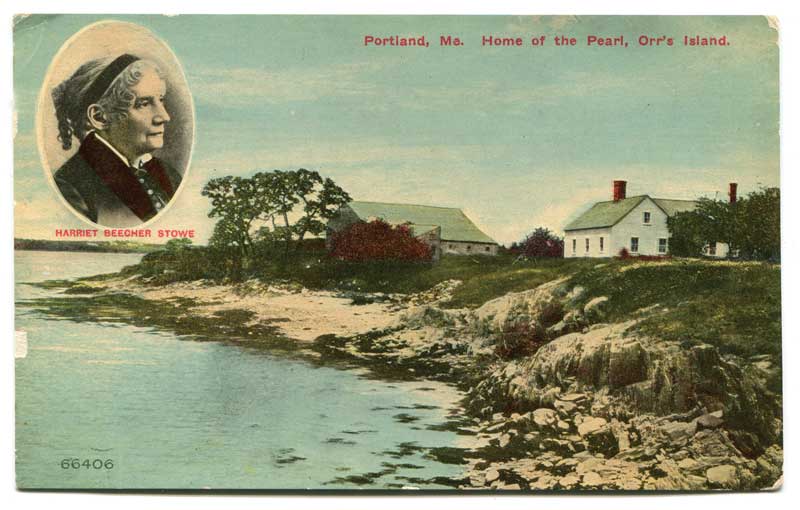Stowe’s The Pearl of Orr’s Island was published ten years after Uncle Tom’s Cabin (1852) is a story of the people who speak in the vernacular of Maine, on the road to the Kennebec, below the town of Bath. Its basis is Shakespeare’s The Tempest, and the characters relate according: Prospero is Captain Pennel, Miranda is Mara Lincoln, an orphan shipwrecked on Orr’s Island, and Ferdinand is Moses, another child saved from a wreck. In The Tempest, Miranda and Ferdinand become happy lovers; in Stowe’s adaptation, they have an uncertain future because Moses is an unsettled character unsure of his feelings.

Featured Image: Unknown illustrator. “The Captain Began Leisurely to Open the
Clams.”
Supremely sentimental, when Mara dies, she bequeaths Moses to Sally Kittridge so they can be married. Mara’s sacrifice is meant to be Christ-like, and the novel was highly regarded for its Christian virtues.
Allusions to The Tempest are directly addressed at a beach picnic. Mara has found a copy of the play and questions Captain Pennell: Wal’,” said the Captain, who by this time had found his soundings; “that you’ve been a-tellin’ is what they call a play, and I’ve seen ’em act it at a theatre, when I was to Liverpool once. I know all about it. Shakespeare wrote it, and he’s a great English poet.” “But did it ever happen?” said Mara, trembling between hope and fear. “Is it like the Bible and Roman history?” “Why, no,” said Captain Kittridge, “not exactly; but things jist like it, you know.” In the illustration, Mara sits on the rock, watching and listening to Captain Pennell. A copy of The Tempest is clutched in her hand.
Clam chowder is cooked on the spot. While Sally Pennel harvests monstrous clams, Captain Pennel makes an “extemporary fireplace of loose stones, and to put together chips and shavings for the fire.” He keeps stoked with hemlock boughs. Then as he works, Pennel teaches Sally and Mara the “Down East” way to make chowder. First, he leisurely “opens the clams, separating from the shells the contents, which he threw into a pan, meanwhile placing a black pot over the fire previously arranged with certain slices of salt pork, which soon began frizzling in the heat.” He instructs Sally to peel the potatoes, and “slice em thin.” The trio eats hungrily. But chowder is not enough for the old Captain, and when he returns home, he stops by to tell what he and Mara and Sally were up to; “Wal’, me and the children have pooty much done our supper,” said the Captain. “We made a real fust-rate chowder down there to the cove; but I’ll jist stay and see what the Cap’n’s luck is. Massy!” he added, as he looked in at the door, “if you hain’t got the minister there! Wal’, now, I come jist as I be,” he added, with a glance down at his clothes.”
The expression “Cap’n’s Luck” is a version of potluck that is peculiar to Maine, or maybe only to Stowe.
Featured Image: Unknown illustrator. “The Captain Began Leisurely to Open the Clams.” Maine (1862). Published in London 1861. Image published by May Louise Harvey. “The Picnic in the Cove from The Pearl of Orr’s Island by Harriet Beecher Stowe.” In The American Normal Readers Fifth Book. Boston: Silver, Burdett, and Company, 1914

